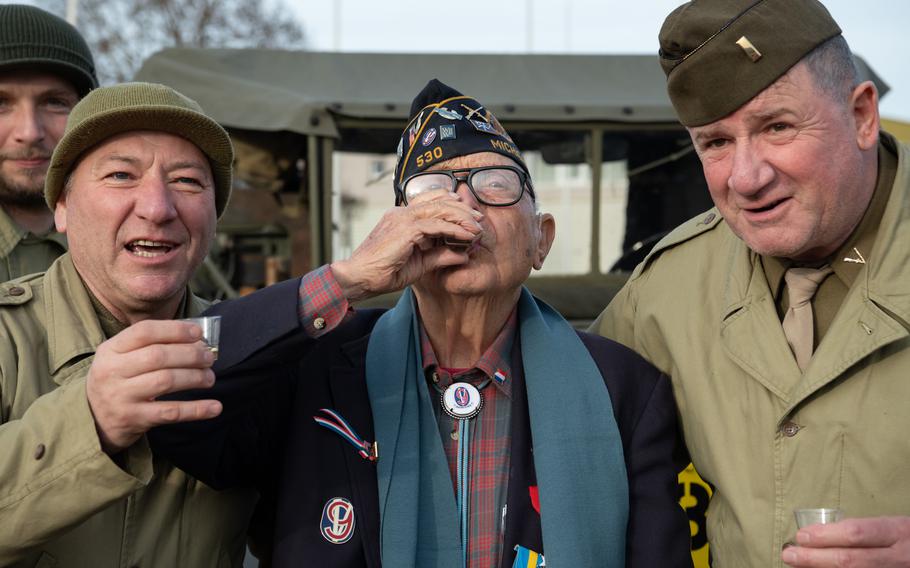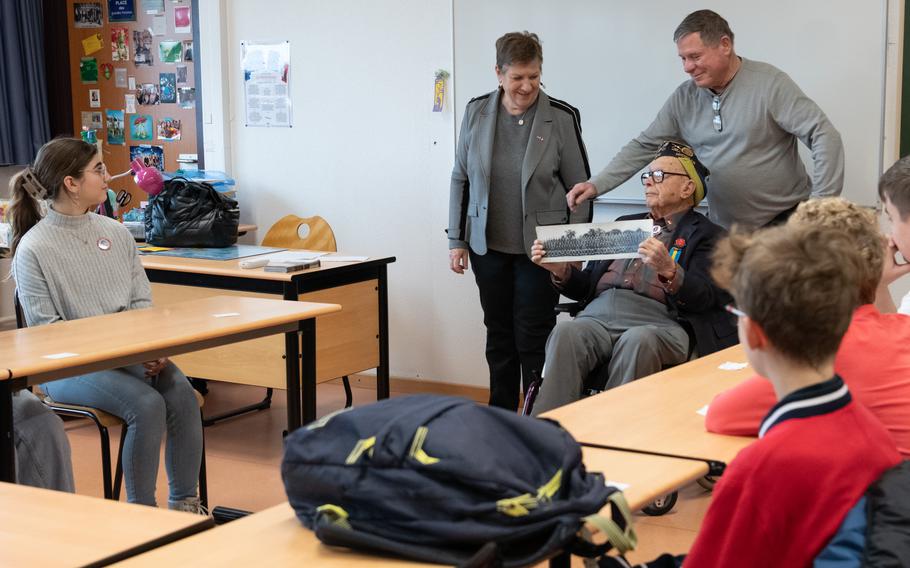
Army WWII veteran Ceo Bauer, 101, downs a shot of a local spirit with World War II reenactors in Saint-Avold, France, Nov. 24, 2024. Bauer participated in the liberation of Metz 80 years ago. (Phillip Walter Wellman/Stars and Stripes)
METZ, France — For over 30 years, officials in Metz have invited American soldiers who helped liberate the city from Nazi occupation during World War II to participate in commemorative ceremonies celebrating the city’s freedom.
This year marks 80 years since the liberation, but only one soldier could make it back: Pfc. Ceo Bauer, who is 101. It appears this will be the last year a living veteran of the war will be able to share firsthand accounts with the city’s people.
“I’m pragmatic,” Bauer said. “If the good Lord allows it, I will come back. But I would think this would be my last time.”
Stars and Stripes accompanied Bauer for several days as he toured Metz and neighboring areas of France that the U.S. helped liberate eight decades ago.
The visit, which spanned two weeks, was packed with appearances and speaking engagements, at which people lined up to chat, get his autograph and take selfies with him.
The well-wishers met a man quick to share a smile and embrace the moment — at one function, Bauer set aside his walker for a quick dance, with a little help.
It’s been a tiring trip for family and friends traveling with him, some half his age. But even a snowstorm wouldn’t stop Bauer from honoring his fellow soldiers.
“This is my duty,” Bauer said. “I’ve got a real bad cold and all that, but this isn’t about me. I’m doing it for others. I’m doing it for my comrades, I’m doing it for the U.S. military, I’m doing it for the United States. Because I’m the only one to do it.”
Bauer, a Michigan native, was drafted into the Army in 1943 and assigned to I Company, 377th Regiment, 95th Infantry Division.
The division landed on Normandy’s Omaha Beach in September 1944, a few months after the D-Day landings. At one of his recent speaking engagements, he described a sign he saw while walking up the bluffs that said, “Up this path have crossed some of America’s finest manhood.”
He still thinks of the sign and gets emotional when recalling all the fine men his unit would go on to lose.
In early November 1944, Bauer and his fellow soldiers received orders to attack and seize Chateau Brieux in Maizieres-les-Metz, just outside the city. As they were carrying them out, they came under attack.
Shrapnel tore through Bauer’s left arm, side, face and leg. Two soldiers by his side were killed. Unable to walk, he crawled back to his company line and received medical attention.
Bauer was too severely injured to return to battle, but other 95th Infantry Division soldiers entered Metz and advanced further into the Lorraine region. Their efforts earned them the nickname “the iron men of Metz.”
In 1989, the city erected a monument to the division, and it was around this time that officials began inviting soldiers back to commemorate major anniversaries.
A memorial ceremony at the monument on Friday was hit by a snowstorm. While many officials crossed their arms and shivered, Bauer sat straight up and saluted.
Col. Gabriel Chinchilla, defense attache at the U.S. Embassy in Paris, laid a wreath during the ceremony and spoke fondly of Bauer on the sidelines.
“It’s amazing all the energy he brings to helping us remember not only what he did, but what many of his other countrymen and fellows from the 95th Division did,” Chinchilla said. “There are challenges now, in the United Sates and in France, with getting young people to join the military. These little things can go a long way to help people understand what it is to serve.”
Bauer was joined in France by some 60 members of the 95th Infantry Division Association, a group started by people from the division shortly after the war. It’s now made up mostly of their relatives.
Cliff Twaddle, who leads the group, said there are about 10 division members still alive out of nearly 15,000 soldiers.
“There’s always a concern that as the years pass, memory will fade,” Twaddle said at Metz’s City Hall on Friday night. “But we continue to get inquiries from relatives of soldiers, and as long as they’re willing to continue to get together, we’ll be here.”
After its famous success at Metz, the 95th Infantry Division advanced through the Moselle region and liberated towns like Saint-Avold, not far from the current border with Germany.
The town held its own liberation celebrations over the weekend. On Saturday, there was a screening of the documentary film “The Girl who Wore Freedom,” which Bauer briefly appears in.
“You are here with a living legend, and you will never get this opportunity again,” Christian Taylor, the film’s director, told the audience, visibly emotional. Bauer lightened the mood by telling Taylor she should have included more of him in her film.
Despite the serious nature of his visit, Bauer kept those around him upbeat. After being made a knight of the Order of Lafayette at a ceremony in Saint-Avold on Sunday, he downed a shot of local spirit with World War II reenactors, then tossed the plastic shot glass in the air behind his head.
The award recognizes individuals for strengthening relationships between the United States and France.
Air Force Maj. Christian Maude, who met Bauer earlier this year at D-Day commemorations in Normandy, is stationed at Ramstein Air Base in Germany, about 50 miles east of Saint-Avold.
He came so his two daughters could meet Bauer. The younger of the two is a century younger than the veteran.
“It’s really important for us to come out and honor him, and it’s special to share him and his story with my daughters,” Maude said.
Lidwine Calte, who lives nearby, wore 1940s attire in memory of her grandmother and thanked Bauer.
“This is a very special moment,” Calte said. “It’s the last time that we can listen to what he has to say. We need to learn and keep the memory alive.”
Saint-Avold is home to the Lorraine American Cemetery, the largest American cemetery in Europe, which honors the memory of nearly 10,500 military personnel who lost their lives during the war.
Of those, over 150 were assigned to the 95th Infantry Division.
Brig. Gen. John Cogbill, the deputy commanding general for the 18th Airborne Corps, spoke at the separate ceremony there Sunday afternoon.
The 18th Airborne is based at Fort Liberty in Fayetteville, N.C., a sister city of Saint-Avold, and nearly 300 of its soldiers are buried in the cemetery.
“This ceremony is a solemn reminder of the horrible cost of war,” Cogbill told the crowd. “These headstones represent the heroes who never made it home.”
Pointing to Bauer, Cogbill added that some heroes did make it home. Bauer later visited the graves of two men he had known and shared his memories of them.
He passed on similar stories the following day when he visited a school in the small village of Drulingen. Bauer brought with him a black-and-white group photo of his unit and explained to the children how many of those depicted had died or were seriously injured, like himself, while fighting for common values shared by the U.S. and France.
The students asked questions, one of which took Bauer by surprise.
“Do you have any pets?” a small boy said. His teacher explained that the class was learning how to talk about pets as part of their English lesson.
Bauer answered that he often feeds the cats behind his house in Ithaca, a town in central Michigan. He then had the children chant with him: “Vive la France. Long live the United States of America and our free-world allies.”
It was a chant Bauer repeated throughout this visit.
Amy Uthe, Bauer’s great-great niece by marriage, said she will continue to come to France to help carry on the legacy.
“We know how important this is to him, and it’s our responsibility to make sure that that memory lives on,” Uthe said.

World War II veteran Ceo Bauer, 101, shows a photograph of his Army unit to French students, while visiting a school in Drulingen, France on Nov. 25, 2024. (Phillip Walter Wellman/Stars and Stripes)